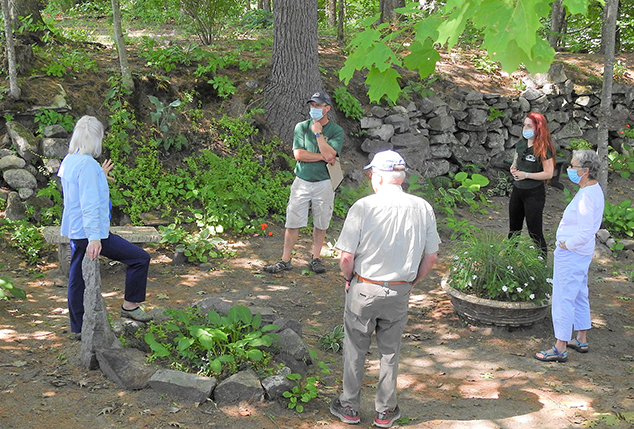
On a sunny August morning in Andover, on land once owned by famed 19th-century magician Richard Potter, a meeting between representatives of New London’s Spring Ledge Farm and members of the Andover Historical Society board of trustees took place.
Its purpose: to discuss a plan to enhance, enrich, and expand the gardens on the land, with a specific focus on “heritage plantings” that would have been growing there during Potter’s time. The long-term project will begin this fall with a research and design phase, and continue next spring and beyond.
Shown in the photo, in the Historical Society’s “Secret Garden” that was once the cellar of Potter’s home, are, from left, Historical Society treasurer Pam Cooper; Greg Berger (facing camera), Spring Ledge Farm owner; Historical Society trustee Bill Hoffman (back to camera); Spring Ledge Farm employee Kim Logan, who proposed the project; and Historical Society president Gail Richards.
Purpose of the project: To boost visitation to the property so that the life and accomplishments of one of Andover’s first African-American residents becomes better known and understood.
The Potter lands are part of the Historical Society’s larger Potter Place holdings, which also include the Potter Place Railroad Station and freight shed, the Emons General Store, and the Gordon-Lull House. Although the grounds are open to visitors (including bikers on the Northern Rail Trail), the buildings are currently closed because of the coronavirus pandemic.
Spring Ledge Farm is a family operation, started and grown by John and Sue Clough for 30 years. Greg Berger purchased Spring Ledge in 2005, after working alongside the Cloughs for 20 years.
According to the farm website: “Located in the heart of New London, we continue the tradition of providing our community with the best ornamental plants, fresh vegetables and fruits, cut flowers, sweet corn, and our own strawberries. We also offer high-quality hard goods, products from local farmers and makers, fresh local dairy and eggs, as well as potting soil, compost, and fertilizers to make sure your plants have a great start.”